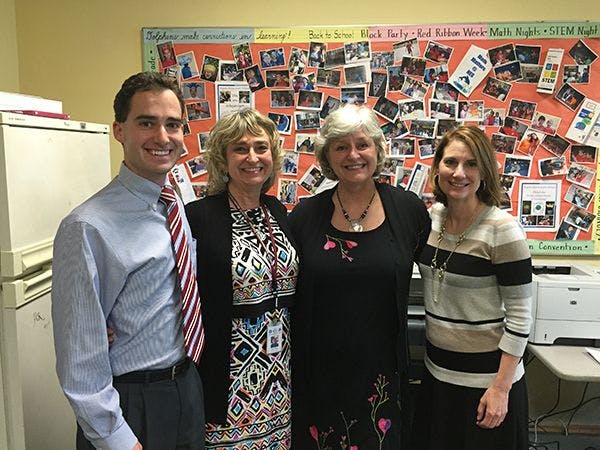New project takes gifted education at Department of Defense schools to next level
Nearly 200 schools spread across 12 countries, the United States and its territories are about to get a major lesson in gifted education thanks to the work of two University of Georgia College of Education researchers.
After spending the past two years evaluating gifted programs at schools run by the Department of Defense, the team will now begin a new phase: Putting proposals into action.

The project, funded by a one-year, $208,000 cooperative agreement from the Department of Defense, comes on the heels of a two-year, $360,000 project to assess schools' gifted programs and make recommendations. These Department of Defense-run schools serve about 73,000 children of military personnel.
"We're trying to walk that tightrope between best practices and reality, especially when reality includes layers of government and financial constraints," said Bonnie Cramond, a professor in the department of educational psychology who is doing the research with Sarah Sumners, interim director of the Torrance Center for Creativity and Talent Development. Cramond and Sumners are now crafting a new program guide that will help the schools be more uniform in their instruction and help implement more current teaching methods.
Gifted education "is a big deal in DODEA schools because there's a lot of transfer. So if there isn't a lot of equity among the schools, it's parents who get upset," Cramond added. DODEA is the acronym for Department of Defense Education Activity, the department that oversees schools for children of members of the military.
One of the biggest challenges for the team during the initial two-year phase of the project was simply trying to find a baseline for the programs in place at nearly 200 schools across the world. A handful of evaluations were done in person, while others were done via videoconference. At the end of the project, the team made recommendations and suggested changes; some, such as hiring someone to oversee the gifted programs across all the schools, have already been implemented.
Now, the challenge is to update the schools' guidelines in a way that can be applied around the world. Each school is different, with varying resources, and in the 12 years since guidelines for gifted education were written, Sumners and Cramond said, there has been a philosophical shift in how it's taught.
"Most gifted programs have moved away from relying on simply IQ tests or achievement tests. The big move in gifted education is trying to identify and serve talents," said Cramond. For example, if a student is good at math, the school offers higher-level lessons to that child rather than follow a set curriculum that's applied to all students.
"We try to define exactly what a child's educational needs are and try to make the curriculum to meet the needs, instead of curriculum meeting everybody."
Cramond and Sumners are part of a team that includes graduate students Sarah Marie Catalana, Kate Guthrie and Harum Tadik. The previous project included experts from the College's Program Evaluation group and UGA Extension.
After writing the program guides, the team will begin working on training modules for teachers, to help them learn how to identify and serve gifted children. Again, they will keep individual school resources and logistical barriers in mind when writing the guidelines. But Sumners, who grew up in a military family attending Department of Defense-run schools, said this is a great opportunity to help teachers in far-flung corners of the world to learn the latest in gifted education methods.
"This creates a unique opportunity for us to shift the ways in which DODEA identifies gifted students, toward a more inclusive model," she said. "And you realize the challenges they have, even for the teachers. There may be one teacher in a town who is the only teacher of the gifted, because the population isn't very big. But that's why we propose the training using video vignettes, activities and electronic means, so they can use and re-use them."
Funding comes from the Gifted Education Program Project, provided for under a cooperative agreement between the National Institute of Food and Agriculture, U.S. Department of Agriculture and Department of Defense. It is funded under cooperative agreement number 2016-48785-25886.